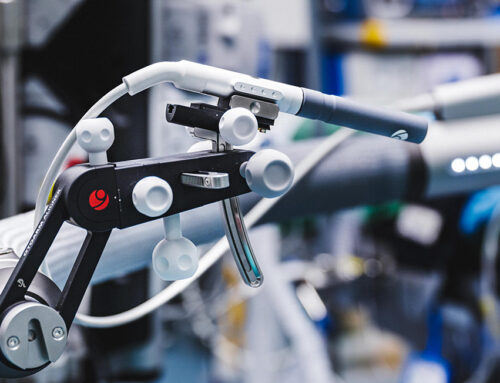Hearing aids and hearing implants can reduce risk of dementia
Hearing loss affects not only communication but also mental fitness. It’s an often underestimated risk factor for neurocognitive diseases. In May, Prim. Dr. Thomas Keintzel discussed this important topic during the “Mit allen Sinnen” Knowledge Forum at Klinikum Wels-Grieskirchen.

The link between hearing loss and dementia
Between 300 and 400 attendees followed the presentations at the “Mit allen Sinnen” forum at Klinikum Wels-Grieskirchen. Specialists shared insights on persistent cough, common eye diseases, prevention and treatment of severe skin conditions, and the link between hearing ability and dementia.
In the Q&A session, the focus shifted to hearing loss. As Dr. Thomas Keintzel, Head of the Department of Ear, Nose and Throat Diseases at the clinic, summarized, most questions came from people "who suffer from hearing loss themselves and are dissatisfied with their current hearing care.”
Hearing and thinking are closely connected
A few words later, many of the questioners realised that a certain cognitive change had already begun in them as a result of their hearing loss. Hearing processing and neurocognitive functions are closely interrelated. The change in cognitive sound processing is not yet dementia, but it can lead to dementia or be a first sign of it. Numerous studies show that there is mutual influence between hearing loss and dementia.
Early hearing care protects the brain
As Dr. Keintzel explains, neurocognitive changes can be detected through imaging diagnostics: “The hippocampus decreases in volume.” This applies to both mild cognitive impaitment and full dementia. With early hearing care, e.g. through hearing aids or cochlear implants, cognitive performance can be stabilised and the risk of dementia can be reduced.
Quality of life in older age
"The WHO’s Global Burden of Disease study found that both hearing loss and dementia are among the most significant illnesses in developed countries, leading to severe quality-of-life limitations," Keintzel reports. The ENT specialist is particularly committed to hearing impaired patients of all ages and is considered an expert in hearing implants.
In Austria, according to Austria’s Ministry of Health, around 130,000 to 150,000 people are currently living with dementia, with the strong trend upwards. “By 2050, this figure is expected to double,” Keintzel explains, naming the aging population as the main reason behind this trend.
Risk factors for dementia and why hearing is part of it
Primary dementia develops directly as a result from nerve cell death. Secondary dementia, on the other hand, is triggered by environmental influences or other illnesses. The Lancet Report 2024 identifies 14 scientifically proven risk factors, including hearing loss. Keintzel emphasizes: “It is also up to us to actively protect our brain.” Regular hearing tests and early treatment significantly reduce the risk of hearing loss and dementia.
Hearing loss: more than a bothersome old age condition
"Hearing and cognition cannot be viewed separately. Not even in young people," Dr. Keintzel points out. Studies show that people with untreated hearing loss have significantly increased risk of dementia.
Starting at the age of 60, the hearing performance decreases by about one decibel each year. 30% of 60- to 70- years old are affected, and people above 70 significantly more. The age does not only affect the ear, but also the central auditory processing in the brain, which is an essential factor for hearing loss and dementia.
Hearing implants to stay mentally fit
"Acoustic simuli keep the brain active. If they are missing, it begins to decay faster", warns Keintzel. Hearing aids or cochlear implants, combined with the right auditory training, can slow down the decline in neurocognitive abilities. The examples from the praxis showed that an elderly patient experienced surge after implantation, which illustrates that hearing care can prevent dementia, especially when it happens early.
Early diagnosis thanks to double screening
Hearing loss and dementia show similar symptoms: social withdrawal, slow thinking, frequent repetition of questions. Therefore, Keintzel recommends an additional cognitive screening in case of hearing problems. With the special O-DEM test, you can detect dementia in the early stage. That way, the effective treatment can be initiated and mental decline can be slowed down.
Already in 2014, the US researchers [1] found the connections:
- In case of hearing loss, the affected individuals must exert more effort to interpret what they hear correctly: listening is a constant multitasking.
- Changes in ear lead to changes in central auditory processing, which mean cognitive changes.
- Hearing problems can lead to social withdrawal.
Each of these factors impair general cognitive functions, which are further reinforced by additional health problems such as circulation disorders or age. Anymore who must focus more on hearing and understanding due to hearing impairment lacks these cognitive capacities for other functions [2]. If a person has fewer cognitive reserves, this change becomes visible to others. "It is not about intelligence, it´s about whether someone is mentally fit" Prim. Keintzel points out.
Active prevention of dementia with a hearing implant
People who are mentally fit can compensate for hearing loss longer, but they should take action regardless of age! The ENT-specialist remembers a patient who was 80 years old, once sociable and full of live who withdrew as his hearing declined. When he finally came to the clinic, he was already functionally deaf and seemed indifferent to life. The team at the clinic convinced him to undergo cochlear implantation. The doctor describes how with his hearing ability, his mental health blossomed again. "If I hadn´t provided him with a CI, he would probably have soon experienced cognitive decline."
Hearing problems can also be an early warning sign of developing dementia. "Studies such as Baltimore Longitudinal Study [3] show that cognitively healthy people with hearing impairment have a significantly higher risk of developing dementia-related diseases later in life." The symptoms of both impairments are similar: social withdrawal, slow thinking, asking people to repeat what they said, hard to follow a conversation. Thus, a timely hearing care is a promising countermeasure.
Hearing keeps the brain fit and it is an indicator of cognitive health
“Acoustic stimuli keep the brain active. If they are missing, the brain will deteriorate more quickly,” warns Dr. Keintzel. Hearing aids or hearing implants, combined with the right auditory training, can slow the neurocognitive decline in people with hearing impairment. Older adults particularly benefit from modern hearing solutions. “Despite the effectiveness, people are still full of prejudice towards hearing aids. In Austria, only about 15 to 20 percent of the affected use them!”
If a patient is not satisfied with their hearing aid(s), Prim. Keintzel considers it the duty of the ENT specialist to perform careful differential diagnostics:
- Does the device need better fitting?
- Is switching to another device or to an implant advisable?
- Are neurocognitive impairments already present?
In the latter case, Keintzel recommends auditory training combined with cognitive training. The brain must be challenged regularly like a muscle, otherwise its abilities degenerate and can only be reactivated through exercises. “This is like a weight training for neural processing,” he jokes.
On the other hand, some forms of dementia typically begin with hearing impairment. The head of the Audiology Working Group of the Austrian ENT Society therefore recommends the following: “Whenever cognitive impairment is present, additional hearing screening should always be carried out. Conversely, when hearing impairment exists and there is clinical suspicion of additional cognitive impairment, dementia screening should be performed.” If affected persons not only understand less but also react more slowly overall, an O-DEM test, a specific cognitive screening for patients with hearing impairment, is urgently recommended.
[1] Livingston G Huntley J Liu KY et al. Dementia prevention, intervention, and care: 2024 report of the Lancet standing Commission. Lancet. 2024, https://doi.org/10.1016/S0140-6736(24)01296-0
[2] Lin, F. R. & Albert, M. (2014). Hearing loss and dementia – who is listening? Ageing & Mental Health, 18(6), 671-673. https://doi.org/10.1080/13607863.2014.915924
[3] Tun, Patricia et al. (2009). Ageing, hearing acuity, and the attentional costs of effortful listening. Psychol ageing. 24: 761-766. Psychology and ageing. 24. 761-6. https://doi.org/10.1037/a0014802.
[4] The Baltimore Longitudinal Study of Ageing BLSA, National Institute on Ageing, https://www.nia.nih.gov/research/labs/blsa
11 Warning Signs of Dementia
- Memory gaps and forgetfulness
- Difficulty following a conversation
- Disorientation in time or unfamiliar places
- Trouble recalling specific words during conversation (“the thing…”)
- Reduced judgment and decision-making ability
- Misplacing objects
- Problems with visual and spatial perception
- Struggles with everyday tasks
- Mood swings and changes in behavior
- Trouble keeping track of processes and tasks
- Withdrawal from work or social activities






